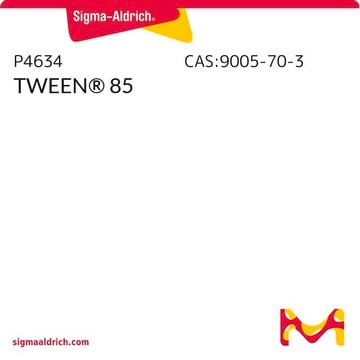S6635
Span® 20
Synonym(s):
Sorbitan laurate, Sorbitan monolaurate
About This Item
Recommended Products
description
non-ionic
Quality Level
mol wt
346.47 g/mol
greener alternative product characteristics
Use of Renewable Feedstocks
Learn more about the Principles of Green Chemistry.
sustainability
Greener Alternative Product
concentration
≥44% (GC)
greener alternative category
, Aligned
SMILES string
CCCCCCCCCCCC(=O)OC[C@@H](O)[C@H]1OC[C@H](O)[C@H]1O
InChI
1S/C18H34O6/c1-2-3-4-5-6-7-8-9-10-11-16(21)23-13-15(20)18-17(22)14(19)12-24-18/h14-15,17-20,22H,2-13H2,1H3/t14-,15?,17+,18+/m0/s1
InChI key
LWZFANDGMFTDAV-WYDSMHRWSA-N
General description
Application
Other Notes
Legal Information
Storage Class Code
10 - Combustible liquids
WGK
WGK 1
Flash Point(F)
>300.2 °F - closed cup
Flash Point(C)
> 149 °C - closed cup
Personal Protective Equipment
Certificates of Analysis (COA)
Search for Certificates of Analysis (COA) by entering the products Lot/Batch Number. Lot and Batch Numbers can be found on a product’s label following the words ‘Lot’ or ‘Batch’.
Already Own This Product?
Find documentation for the products that you have recently purchased in the Document Library.
Customers Also Viewed
Our team of scientists has experience in all areas of research including Life Science, Material Science, Chemical Synthesis, Chromatography, Analytical and many others.
Contact Technical Service










